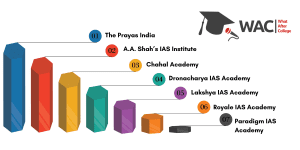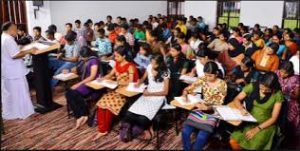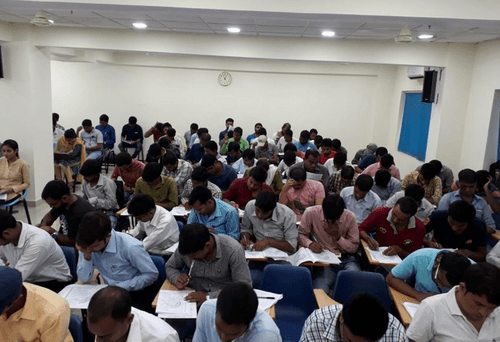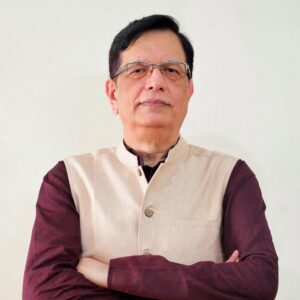Ram Krishna investigates the follies the coaching institutes make and suggests the ways they can improve, for the sake of the aspirants, and also help the cause of civil services. An exclusive for Different Truths.
Civil service is a premier service in India. The service provides power, prestige, a variety of roles, and opportunities to be of service to the people and be an agent of change in society. Naturally, for decades, the Civil Services Examination (CSE) has been receiving great importance and preference amongst young, bright people aspiring for a decent and meaningful career in life. Arguably, this is the only such exam in our country, where the entire family, friends, extended kinship, of an aspirant, are invested, through consistent support, well-wishing, blessings and prayers.
Civil service is a premier service in India. The service provides power, prestige, a variety of roles, and opportunities to be of service to the people and be an agent of change in society. Naturally, for decades, the Civil Services Examination (CSE) has been receiving great importance and preference amongst young, bright people aspiring for a decent and meaningful career in life.
Obviously, thousands of young people — some driven by a passion to serve the nation, some enamoured by glamour and entitlements, some with other  motivations-aspire for the civil services. These motivations and yearning to get into this coveted service, coupled with robust family support, provide fertile grounds for coaching institutes to mushroom and flourish. Their expanse, both physical and digital, have grown significantly across all states. Even many of those coaching centres that have been catering to exams other than civil services have upgraded and rebranded, albeit in a shoddy manner, to make their institutes financially more viable and aspirational.
motivations-aspire for the civil services. These motivations and yearning to get into this coveted service, coupled with robust family support, provide fertile grounds for coaching institutes to mushroom and flourish. Their expanse, both physical and digital, have grown significantly across all states. Even many of those coaching centres that have been catering to exams other than civil services have upgraded and rebranded, albeit in a shoddy manner, to make their institutes financially more viable and aspirational.
The coaching institutes promise, overtly or covertly, to pass on that ‘secret sauce’ that can help the aspirants master the art of ‘cracking’ the exam and ‘beat’ the system. Given the wide publicity and hoardings of these institute claiming their contribution in getting their candidates crack the test, it is tempting for any new aspirant to fall for it. However, on a closer look or a little scrutiny, the claims may appear spurious or act of bragging. Rival claims, overlapping cases, slant or limited interfaces of such successful aspirant with the institutes, overall successful candidates’ own experiences and revelations, in general, are some facts that unmask a large number of such institutes and call out loudly the amount of exaggeration and meretriciousness in their assertions. While such tall and often misleading claims are understandable in the backdrop of the cut-throat competition and rat-race amongst the institutes themselves, and demands of ‘business model’ and the ‘market’, sadly though, their real contribution, by and large, is peripheral and minimal. The ‘secret sauce’ or ‘mantra’ remains almost elusive.
The coaching institutes promise, overtly or covertly, to pass on that ‘secret sauce’ that can help the aspirants master the art of ‘cracking’ the exam and ‘beat’ the system. Given the wide publicity and hoardings of these institute claiming their contribution in getting their candidates crack the test, it is tempting for any new aspirant to fall for it.
It is not that the coaching institutes lack resources or found wanting in their efforts. Given the huge fees charged from aspirants, this should not be the case. Indeed, some of the big players are trying their best in terms of better infrastructure, experienced faculty, copious reading and reference materials, and even post-coaching counselling to entice the aspirants. Some have even roped in celebrated civil servants to augment their attractiveness and brand. So the good intent to serve and ability to provide resources — faculty and non-faculty — to the aspirant-clients are not in doubt. Then what is missing? Where they have got it wrong?
The reasons lie in their follies in their basic templates, approaches and pedagogy styles that are out of sync with, and incompatible to, the real intent and purpose of CSE. Let us identify some of the major follies.
Follies
- The CSE is seen as an extension of university exam
The CSE is seen as one- dimensional, dry academic pursuit. As we all know, there are some typical “set features” of our higher education system. Some notable ones worth recapitulating are:
– One gets incentivised and rewarded through cramming and ‘rote learning’.
– Familiarity with entire syllabus not needed. Some ‘important’ topics or questions can be mapped or guessed, and by cramming those, good marks could be scored.
– No need for ‘understanding’, ‘critical thinking’ or ‘development of a spirit of enquiry’
– Answer sheets should appear ‘eye-friendly’, so to say, in terms of filling each inch of space by writing ‘something’ — of whatever value or relevance.
– No perspective building. No need for finding inter-linkages across streams of knowledge through reflection or contemplation.
– Students are essentially seen as Pariksharthi ( examinee), not as Upasak ( learner)
It is no surprise then to see how the lower performance of aspirants, more often than not, are linked to poor standards of university education, afflicted with the above-mentioned malaise. Yet this practice, approach and mindset are unfortunately perpetuated by the coaching institutes.
CSE is a strong pointer on how traditional pedagogy and mindset of our educational institutions towards learning is severely inadequate and deficient and calls for urgent change and reinventing do grasp and deal with contemporary issues and challenges.
 CSE tries hard to demolish this narrow, one-dimensional and useless ‘time- tested’ template towards ‘cracking’ exam and the stratagem to find ‘easy’ and ‘short-cut’ ways to have rewards and success. Indeed, CSE is a strong pointer how traditional pedagogy and mindset of our educational institutions towards learning is severely inadequate and deficient and calls for urgent change and reinventing do grasp and deal with contemporary issues and challenges.
CSE tries hard to demolish this narrow, one-dimensional and useless ‘time- tested’ template towards ‘cracking’ exam and the stratagem to find ‘easy’ and ‘short-cut’ ways to have rewards and success. Indeed, CSE is a strong pointer how traditional pedagogy and mindset of our educational institutions towards learning is severely inadequate and deficient and calls for urgent change and reinventing do grasp and deal with contemporary issues and challenges.
- The coaching institutes work on ‘techniques’ and ‘arts’ and not ‘mental quality’ and ‘attributes’ — reasoning, asking questions, thoughtfulness, perspective building
The content and design of CSE are such that most of the answers are required to be thought, shaped and penned down by an aspirant, in the limited time horizon, in the examination hall itself. It is difficult beyond a limited threshold to ‘draw upon’ and ‘reproduce’ memorised content. This is because of the ‘novelty’ of questions. They, among other mental qualities, expect appreciation of connectedness of issues and synthesis of knowledge. Thus, to answer well, an aspirant should have the traits of ‘reflection’ ‘thoughtfulness’, ‘right perspective’ and ‘intellectual cohesion’. (This trait is tested in Essay paper in Mains too). Further, by force of the accumulated ill-habits acquired through the student days, one typical stubborn habit of ‘verbosity’ that die-hard and comes to the fore. The trait of brevity in writing and speech is neither cultivated nor valued. This is reflected in compulsive tendencies of excessive, irrelevant, ‘beating about the bush’ — writing, dishonouring the precise demand of a question.
The content and design of CSE are such that most of the answers are required to be thought, shaped and penned down by an aspirant, in the limited time horizon, in the examination hall itself. It is difficult beyond a limited threshold to ‘draw upon’ and ‘reproduce’ memorised content. This is because of the ‘novelty’ of questions.
The novelty in questions also tries to test an aspirant’s ability to see a ‘bigger picture’ in various issues. This means an integrated thought-process and intellectual cohesion. In short, the mental qualities like the spirit of enquiry, reasoning, learnability, succinctness, clarity in thought, writing and articulation-are some key attributes that are on the test. Indeed, the need for these mental faculties make CSE more of a ‘qualitative’ nature than ‘quantitative’, and distinguishes it sharply from other coveted examinations for entry into IITs, IIMs etc.
- The aspirants are inducted by the coaching institutes as ‘clients’, not ‘seekers of noble goals’
The coaching institutes, in ritualistic pursuit of their business, knowingly or unknowingly, get afflicted with vices that may be inimical to the formative minds of the young aspirants. A rat race, money-making, profiteering, absence of empathy (for aspirants and their parents) may, as negative examples, can adversely impact the mental makeup of an aspirant, who is ideally expected to abhor these traits in his or her future career as a civil servant.
In all the academic and business activities of the institutes, it is important to ‘mainstream’ certain values that CSE hopes to achieve. Any pedagogy which ignores this will not have academic completeness in a true sense.
The ‘process’ of imparting instructions in the name of coaching must not be seen in ‘silo’ –– as ‘capsules of scoring strategy’ –– but as a holistic way to prepare an aspirant to meet the demands of the CSE. Similarly, their business pursuits ought to reflect the ethos of transparency, openness and empathy, acting as role models themselves.
The ‘process’ of imparting instructions in the name of coaching must not be seen in ‘silo’ — as ‘capsules of scoring strategy’ — but as a holistic way to prepare an aspirant to meet the demands of the CSE. Similarly, their business pursuits ought to reflect the ethos of transparency, openness and empathy, acting as role models themselves. This way they will not only enhance their own value and credibility in the eyes of aspirants, their parents and society at large but also be an enabler in competency and character building of their aspirant-clients, irrespective of the market-driven parameters of ‘percentages of success’. The ‘coaching’ process, by becoming a ‘grooming’ process, could be made a memorable experience in the journey of an aspirant to become a civil servant.
Need for reinventing
The most important thing for the institutes is to identify and appreciate the fundamental ‘demands’ that the CSE makes. It is common knowledge and appreciation that, befitting the stature of the Service, the rigour and bar of CSE are very kept very high. To meet the standards set, obviously, the institutes need to work really hard on better and creative designs of their templates, pedagogy and approaches.
Understanding the syllabus and beyond
If one goes through the vast syllabus for CSE, other than optional paper, one may find only limited familiarity with higher secondary school or college syllabus. But what is important to be clear about is the demands the CSE make out of the vastness of the syllabus. These ‘core demands’ are critical to map the ‘right kind of candidate’ suited for the service-in terms of knowledge, attitude and intrinsic values.
If one goes through the vast syllabus for CSE, other than optional paper, one may find only limited familiarity with higher secondary school or college syllabus. But what is important to be clear about is the demands the CSE make out of the vastness of the syllabus. These ‘core demands’ are critical to map the ‘right kind of candidate’ suited for the service-in terms of knowledge, attitude and intrinsic values.
Structure of the demands could be segregated into four broad parts:
Civilisational Demands (History, Geography, Culture, Constitution)
A sense of civilisation broadly encompassing history, geography-specially social geography, and culture is important to appreciate heritage and diversity. Awareness of constitutional provisions is important to cultivate a sense of principles of equality and justice, liberal values and fraternity. They help develop civic virtues so essential for social cohesion and order.
Modernity Demands (Science & Technology, New Researches and Discoveries, Modern Trends and Thoughts)
Modernity is basically questioning the status quo-in all walks of life. This would require in turn appreciation of developments in the field of science and tech, new trends and thoughts and development of scientific temper. A modern mindset is a sine qua non for a civil servant yearning to bring creative solutions to various socio-economic problems and be a change-agent.
Administrative Demands (Policy Action-domestic & International, Schemes, Initiatives, Delivery of Services, Analyses of reasons for the pitfalls, inefficiencies, ineffectiveness, solution to address them).
The importance and need for ‘application’ of knowledge at grassroot level cannot be over-emphasised. An administrator is evaluated by his or her efficiency, effectiveness, can-do attitude, quick adaptability and timely delivery.
The importance and need for ‘application’ of knowledge at grassroot level cannot be over-emphasised. An administrator is evaluated by his or her efficiency, effectiveness, can-do attitude, quick adaptability and timely delivery. These professional and managerial competence, demonstrated in a biased and non-partisan manner, are some hallmarks of an able and accomplished administrator and civil servant. So a fair degree of knowledge about the on-going policies, programs, schemes, measures and initiatives are needed in detail. Only by having knowledge about them one can think of improving upon them or find better solutions.
Empathetic Demands (Mindset towards disadvantaged, marginalized and vulnerable, Openness, Humility, Rationality, Fairness, Courage of conviction, Character through civic virtue and moral values, etc).
This is really a difficult part. Empathy cannot be grafted, it has to be internalised and, more importantly, ought to be revealed in action. This part, that is the emotional mental make-up of an aspirant, is very well mapped in the Mains examination and personality test. Here, the inspirational stories on famous personalities, real-life examples of heroes amongst us, reflection, contemplation, self-suggestion etc can help the aspirants internalise and build on values learnt from parents, teachers, peers and others.
An important thing is to appreciate that it is a sin to “fake” empathy and thereby “game” a system. There is no way to empathy, empathy is the way. Indeed, empathy ought to be the most valuable and cherished virtue of a civil servant. The coaching institutes will do a great service to the aspirants and society by mainstreaming empathy
An important thing is to appreciate that it is a sin to “fake” empathy and thereby “game” a system. There is no way to empathy, empathy is the way. Indeed,  empathy ought to be the most valuable and cherished virtue of a civil servant. The coaching institutes will do a great service to the aspirants and society by mainstreaming empathy in all of their pursuits by using suitable templates and approaches.
empathy ought to be the most valuable and cherished virtue of a civil servant. The coaching institutes will do a great service to the aspirants and society by mainstreaming empathy in all of their pursuits by using suitable templates and approaches.
The soft structuring of the entire scope of the syllabus in the four broad groups may greatly help the aspirants to align their mind and heart to the scheme of CSE. Further, this approach of understanding the demand, at the same time, is likely to nudge the aspirants to reimagine the syllabus differently, in a non-onerous way and where they may even find the “journey“ itself elevating and inspirational.
The approach will also give ‘meaning’ to their preparation and ‘depth’ in the understanding of various issues.
For all this to accomplish, the coaching institutes would do well first to look inward and revamp, with clear-eyed focus, some of their own systems and practices.
For all this to accomplish, the coaching institutes would do well first to look inward and revamp, with clear-eyed focus, some of their own systems and practices. Some suggestion, as below, may help:
- Sensitization Course for top management and faculty: There should be sensitisation program for management personnel and, more particularly, faculty. Intensive sensitisation or refresher courses, on suitable intervals, are needed for them to re-energise, reflect and relearn. Certain core values and code of ethics need to be the touchstone of any business, more specifically, for those in the business of learning and academics, and that too meant for aspiring civil servants.
- Imparting experiential learning to the aspirants: Seeing is believing. To have a better understanding, appreciation of issues and intellectual exploration it would help if field visits are conducted. For example, to appreciate the importance of heritage, the harmful side of pollution of the river, or working of MGNREGA, visits to sites or real-life scenario may give perspectives. Audio-visual clips may also help.
- Evaluation of faculty by the aspirants: Faculties should be rated continuously by the aspirants. Domain expertise is very much needed, but their energy level, animated and passionate style of delivery and worldview are equally important. High performing and rated faculties must be rewarded handsomely. This way the aspirants can get value for their money and the institutes can retain brilliant faculty for a long time.
- Handholding for alternative road-map for a career: The CSE is fiercely competitive. The success ratio is about one out of 1000. In this backdrop, it would be kind of the institutes to set up and run a counselling cum guidance cell for those of their aspirant– clients who could not succeed despite exhausting all their attempts. There are many alternative career paths such aspirants may pursue and the institutes may proactively act as a friend, philosopher and guide. It is important that such youngsters, otherwise having potential and merit to create a mark elsewhere, remain hooked to hope and a deep sense of possibilities and do not develop a defeatist mindset in life.
The CSE is fiercely competitive. The success ratio is about one out of 100. In this backdrop, it would be kind of the institutes to set up and run a counselling cum guidance cell for those of their aspirant — clients who could not succeed despite exhausting all their attempts. There are many alternative career paths such aspirants may pursue and the institutes may proactively act as a friend, philosopher and guide.
These are low-hanging fruits and, given the right intent and willingness to introspect, wouldn’t be difficult to implement. Indeed, adoption of some best practices and standards, at least by big players in the business, will have a demonstration effect on many others, who run their centres purely motivated by ‘commercial’ or ‘mercenary’ considerations.
The institutes, as stated above, are doing their best to beat the system. But success will elude them unless they heal themselves. Hopefully, by dispassionately reflecting on the lines outlined above, they may fare much better by grooming the aspirants- the future civil servants- in the right manner. Else, the institutes will continue to grope in the dark, and the thousands of aspirants so dependent on them will, painfully, continue to be disillusioned and deprived of success.
Photo from the Internet






 By
By
 By
By
 By
By
Sir,
You have thrown light on hitherto untouched area , the quality of IAS coaching institutes and higher education as well.
These institutions provide shortcuts to the path of IAS.
Our higher education system is lacking in giving in-depth knowledge of the subject.
Very valuable article for coaching institutes and higher education.
Regards, g p tripathi Lucknow.